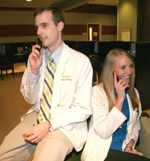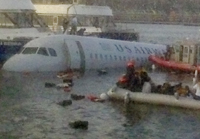|
|

|
Medical student describes NY crash
‘I fully expected to die’
|
by Cindy Abole
Public Relations
It was supposed to be a trip typical of the ones fourth-year medical
students take when searching for medical residency program positions
across the country.
But for Andrew Jamison, 26, the trip to the Big Apple to interview for
a residency spot ended Jan. 15 in the freezing cold water of New York’s
Hudson River.
“I fully expected to die, and I remember thinking to myself that I was
indeed going to meet Jesus that day,” said Jamison, a Fort Mill native.
“Yet somehow, I was feeling a sense of peace with it all.”
 Andrew and Jennifer Jamison Andrew and Jennifer Jamison
For
the previous three months, Andrew and wife, Jennifer, also a
fourth-year MUSC medical student, had been busy traveling the Southeast
and beyond, visiting hospitals and institutions in preparation for the
national residency match day on March 19. This period already is one of
the most stressful times for a medical student, and for Andrew and
Jennifer, it only got more stressful, albeit miraculous and assuring.
Andrew had flown to New York a day ahead of his interview to attend an
informal dinner. The next morning, he met with the staff of Albert
Einstein College of Medicine—Montefiore Division of Dermatology
Residency Training Program in the Bronx.
When Andrew’s meet-ing ended around midday on Jan. 15, he decided to
head home to rest and prepare for the next round of residency
interviews and trips. By chance, he was able to make an earlier flight,
US Airways Flight 1549, leaving LaGuardia Airport for Charlotte’s
Douglas International Airport around 2:45 p.m. He text-messaged his
wife on his cell phone to let her know of his change of plans. He had
not anticipated that this change would involve a harrowing nine-hour
period that would thrust him and others into commercial avia-tion
history.
Matching for a future
Andrew, a 2005 biosystems engineer-ing graduate from Clemson, had his
sights on fulfilling a lifelong dream of becoming a doctor. He had done
well in medical school, where he met and married Jennifer. As a
student, he was inducted into MUSC’s Chapter of Omega Alpha Omega
Medical Honor Society and participated in medical mission trips to
Romania and Morocco as part of MUSC’s Medical Campus Outreach group and
his church, East Cooper Baptist Church. And he began to pursue a
challenging dermatology residency, which is considered among the most
competitive residency programs in which a physician can specialize.
While competing for a job, he joined 155 passengers in a race for
survival when their flight glided above New York City before landing in
the river.
“I had just made the flight and wasn’t really paying much attention to
the pre-flight information when we took off,” Andrew recalled. “I
remember waiting for the ‘all-clear’ signal from the cabin staff, which
gave permission to passengers to use their laptop computers and
electronic devices. That’s when I heard a loud thud as the plane
lurched forward.”
A female passenger to Andrew’s right said she saw smoke coming out of
the plane’s right engine. Instinctively, he turned his attention to
observe the reactions of the flight attendants. One attendant quickly
asked a passenger in the back row behind Andrew to get up as she
struggled to remove an item from behind his seat. The smell of smoke
became more pungent inside the cabin.
Andrew knew enough about planes to know that it was possible for a
plane to temporarily fly on one engine in an emergency. He paused to
hear for any unusual aircraft sounds, but instead, it was deathly
silent. He felt the plane suddenly descend and bank left. At that
moment, he didn’t know if the plane was returning to LaGuardia.
The din of silence
Amid eerie quiet and calm, people slowly realized the severity of the
situation. A slow rise of murmurs, groans and sobbing gave way to faint
whispers of desperate prayers as the plane descended. Andrew calmly
acknowledged the passengers around him and asked if he could share and
recite a prayer with them. They agreed.
“I find that whenever I’m facing a difficult situation I can turn to God and prayer,” Andrew said with confidence.
In those desperate, tense-filled moments, Andrew spoke calmly of God’s
sovereign blessings, and reminded others that God was in control of all
things, especially airplanes without engines.
 A mobile phone picture depics the aftermath and rescue of Flight 1549 in New York's Hudson River Jan. 15. photo by Reuters employee Paula Warfield A mobile phone picture depics the aftermath and rescue of Flight 1549 in New York's Hudson River Jan. 15. photo by Reuters employee Paula Warfield
At
that moment, the cool, controlled voice of the flight’s pilot, Capt.
Chelsey “Sulley” Sullenberger, announced, “Brace for impact.”
Once Sullenberger had guided the aircraft through a remarkable water
landing, Andrew heard the waves sloshing against the plane’s fuselage.
He began to feel the stinging cold saltwater around his ankles. Then,
the crew directed passengers to the front of the plane where they
abandoned the aircraft through both the wing and forward front exit
doors. Within minutes, rescue teams were on the scene retrieving
passengers and transferring them aboard terminal ferries that took them
to safety.
After he boarded a life raft, Andrew began assessing other
passengers for injuries. One man had jumped in the river during the
rescue attempt. After the man was rescued to the raft, Andrew reverted
to his medical skills and instructed others to keep the man warm by
wrapping him with available clothes and guided others to huddle around
him, like penguins do to protect each other from the elements. Later,
Andrew led his fellow passengers in a prayer of thanksgiving for the
rescue and outcome.
Meanwhile, Jennifer, who is pursuing a family
medicine residency, had just ended her rotation in the dermatology
clinic in Rutledge Tower when she received a call from her father. She
had not checked her phone for messages and had been unaware of the
plane crash or Andrew’s situation. After learning that he was safe, she
waited at home until he was able to reconfirm his plans on getting home.
A thankful reunion
“I’ve always had the tendency to worry, especially when we’re not
together,” said Jennifer. “But my faith has only strengthened since
that day and a new peace has filled my heart. I can rest easy knowing
that my husband is not going anywhere a moment before it is his time.”
Word also spread to friends and faculty back at MUSC including Chris
Pelic, M.D., associate dean of students in the College of Medicine.
Andrew had worked with Pelic for six weeks while completing a
third-year psychiatry clerkship in the Institute of Psychiatry.
“Andrew is a bright, genuine, compassionate, thoughtful and mature
young man who worked so well with a variety of patients during his
clerkship,” said Pelic. “I was not surprised to know how well he had
handled the situation in New York. His qualities and attributes came
out loud and clear and will certainly be an asset as he begins to help
patients and provide patient care.”
Not dissuaded by flying, Andrew and 10 of the other passengers boarded
another plane for home that same day. On this flight, most of them sat
near the exit rows. Andrew arrived safely in Charlotte on time where he
met Jennifer and his parents.
“Although it was a surreal experience, it certainly has brought certain
things in life more into focus and that is what’s important and what’s
not. Right now, just going through the residency match process is
worrisome and I and others wonder if we will or will not match. But
I’ve quickly learned there’s worse things in life than not matching,”
Andrew said.
He always knew in his heart that something more powerful was in control that fateful day.
“Going through this experience has certainly affirmed my faith,
strength and trust in God,” Andrew said. “The real heroes of that day
are Capt. Sullenberger, the flight crew and all the New York City
rescue teams.”
Two days later, Andrew boarded a plane to attend another residency
interview in Providence, R.I. But this time, he met up with Jennifer,
who had interviewed in a nearby town, and they flew home together. For
the moment, there are no immediate plane trips in Andrew’s future. He
can get to the remaining residency interviews by car.
Friday, Jan. 30, 2009
|
|
|




